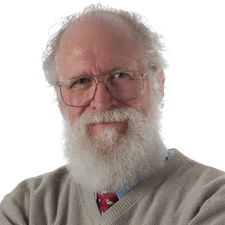Shoulders to Stand On
Doghouse – Courage and Imagination

maddog calls for courage and imagination to overcome our prejudices and address the world's perplexing problems.
Today I received news that Katherine Johnson, a NASA mathematician who performed many of the calculations used by the space program to put people on the moon, has died at the age of 101.
For those of you who did not see the movie Hidden Figures, Ms. Johnson had to fight against both racial and sexual discrimination to have her work accepted in the white male-dominated climate of that day.
I was born in Baltimore, Maryland, in 1950. I saw the "white persons water fountain," the "white persons lunch counter," and the signs that told black people to go to the back of the bus. Even many of our religious leaders told us that the white race needed to "take care of our black brothers and sisters." With all the prejudices that were present at that time, we can appreciate Katherine Johnson's contribution all the more knowing the obstacles she had to overcome. We can also see how the space program benefited from her presence.
[...]
Buy this article as PDF
(incl. VAT)
Buy Linux Magazine
Subscribe to our Linux Newsletters
Find Linux and Open Source Jobs
Subscribe to our ADMIN Newsletters
Support Our Work
Linux Magazine content is made possible with support from readers like you. Please consider contributing when you’ve found an article to be beneficial.

News
-
Parrot OS Switches to KDE Plasma Desktop
Yet another distro is making the move to the KDE Plasma desktop.
-
TUXEDO Announces Gemini 17
TUXEDO Computers has released the fourth generation of its Gemini laptop with plenty of updates.
-
Two New Distros Adopt Enlightenment
MX Moksha and AV Linux 25 join ranks with Bodhi Linux and embrace the Enlightenment desktop.
-
Solus Linux 4.8 Removes Python 2
Solus Linux 4.8 has been released with the latest Linux kernel, updated desktops, and a key removal.
-
Zorin OS 18 Hits over a Million Downloads
If you doubt Linux isn't gaining popularity, you only have to look at Zorin OS's download numbers.
-
TUXEDO Computers Scraps Snapdragon X1E-Based Laptop
Due to issues with a Snapdragon CPU, TUXEDO Computers has cancelled its plans to release a laptop based on this elite hardware.
-
Debian Unleashes Debian Libre Live
Debian Libre Live keeps your machine free of proprietary software.
-
Valve Announces Pending Release of Steam Machine
Shout it to the heavens: Steam Machine, powered by Linux, is set to arrive in 2026.
-
Happy Birthday, ADMIN Magazine!
ADMIN is celebrating its 15th anniversary with issue #90.
-
Another Linux Malware Discovered
Russian hackers use Hyper-V to hide malware within Linux virtual machines.

